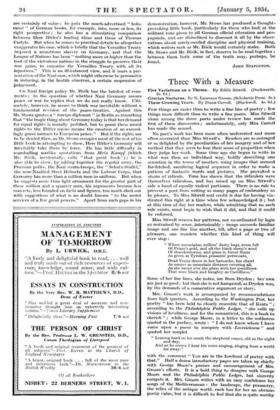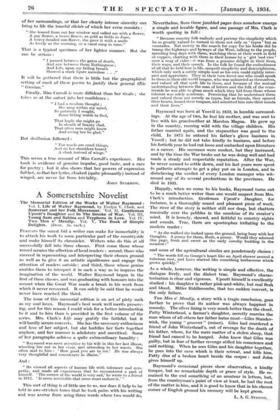Three With a Measure
FEW things are easier than to write a fine line of poetry ; few things more difficult than to write a fine poem. Miss Sitwell alone among the three poets under review has made the first of these discoveries ; unfortunately, lonly Miss Carroll has made the second.
No poet's work has been more often underrated and more often overrated than Miss Sitwell's. Readers are so Outraged or so delighted by the peculiarities of her imagery and of her Method that they seem to lose their sense of proportion when they judge her work. Some time ago she began to write in what was then an individual way, -boldly describing one sensation in the terms of another, using images that seemed far-fetched, sacrificing logical sequence in order to make a pattern of fantastic words and pictures. She provoked a storm of ridicule. Time has shown that the ridiculers were themselves ridiculous, and has raised up on Miss Sitwell's side a band of equally violent partisans. There is no rule to prevent a poet from writing as many pages of embroidery as he pleases. To Miss Sitwell real credit is due for having vin- dicated this right at a time when few acknowledged it ; but at this time of day her readers, while admitting that no such rule exists, must begin to wish that it did, and that it could be enforced.
Miss Sitwell weaves her patterns, not co-ordinated by logic or restrained by sense, interminably : image succeeds familiar image and one fine line another, till, after a page or two of pleasure, one wonders whether this kind of thing will ever stop : "Where mountains, millers' dusty bags, seem full Of Priam's gold, and all the black sheep's wool Of thunderstorms, and grass in forest floats As green as Tyrolean peasants' petticoats, Dead Venus drove in her barouche, her shawl As mauve as mountain distance covering all, As she swept o'er the plain with her postillions That were black and haughty as eastillians."
Some of her fine lines, she notes, are from Dryden ; her own are just as good ; but then she is not hampered, as Dryden was, by the demands of a consecutive argument or story.
Mrs. Groom's work is accompanied by recommendations from high quarters. According to the Washington Post, her poetry "has been held to closely resemble that of Keats " ; according to the Philadelphia Public Ledger, "she calls up visions of loveliness, and for the romanticist, this is a book to cherish " ; while George Moore, in a letter to the authoress quoted in the preface, wrote : "I do not know where I have come upon a poem to compare with Lovesickness" and quoted her couplet
"Leaning hard on his crook the shepherd comes, old as the night and day,
And as he comes I hear his voice singing, singing from a world far away."
with the comment "You are in the forefront of poetry with that." Half a dozen introductory pages are taken up chiefly with George Moore's praises and encouragement of Mrs. Groom's efforts. It is a bold thing to disagree with George Moore and the Philadelphia Public Ledger, but sincerity compels it. Mrs. Groom writes with an easy confidence her songs of the Mediterranean-: the landscape, the peasantry, the relics of the antique world, each has for her an obvious .poetic value, but it is difficult to feel that she is quite worthy
of her surroundings, or that her clearly intense sincerity can bring to life the tuneful clkhes of which her verse consists:
"She leaned from out her window and called me with a flower, A gay flower, a brave flower, as gold as fields in June, - A heavy-headed sun-flower, she gave it with a smile As lovely as the morning, or a carol sung in tune."
That is a typical specimen of her lighter manner. But she can be serious :
" I paused between the gates of death, And saw between them Nothingness ; And Life, upon my failing breath Showed a stark figure merciless . . ."
It will be gathered that there is little but the geographical
setting of most of these poems to justify their general title " Grecian."
Finally, Miss Carroll is more diffident than her rivals ; she takes us at the outset into her, confidence :
"I had a random thought ; She sang within my mind, So patiently I sought, Some fitting words to find,
That haply she might-go In sheath of beauty clad, That often men might know And seeing her be glad."
But disillusion followed :
"For words are cruel things, And on her shoulders bound A cloak instead of wings."
This seems a true account of Miss Carroll's experience. Her book is evidence of genuine impulse, good taste, and a care for poetry ; but it also shows that her powers of expression fail her, so that her lyrics, cloaked (quite pleasantly) instead of
winged, are never far from triviality. -
Joux SPARROIY.







































 Previous page
Previous page